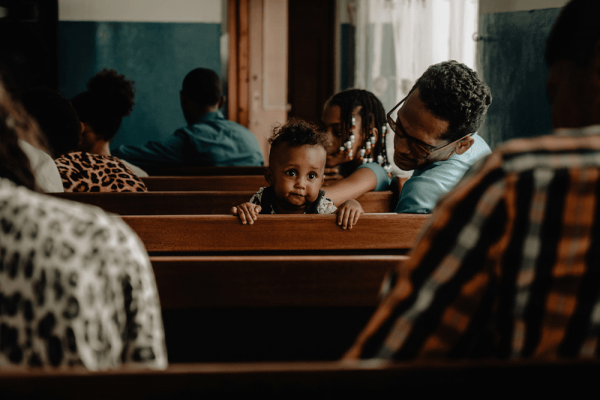I asked my 3-year-old niece, Ember, what she learned in church. She said she learned about Jesus. “Who is Jesus,” I asked. “Where does he live?” She looked at me like I was an idiot, and then said, “Jesus is in our heart. Jesus helps us not be scared and not be afraid.”
It was the kind of simple, childlike answer I expected, but when I relayed it to Amittia Parker, a researcher and children’s mental health expert at Georgetown University’s Center for Child and Human Development, she said that it points to something important: the experience of theology.
Just because young children are not cognitively able to absorb abstract concepts, or even many of the details of a Bible story, they can still be shaped by a church environment, she said. More than a specific curriculum, Parker explained that young children learn about God through the way people at church talk to each other, treat each other, and the various rituals and social behaviors they observe.
“Through repeated interactions over time, the young child learns about themselves and others,” Parker said. “Now and later [a church can] imprint in a young child’s mind that the church is a place where you can find healing and encouragement.”
As part of her research, Parker worked on a research paper that analyzed the role of religious organizations in substance use care. The process, along with her own search for a church for her family, convinced her that “fit” matters. So much of what kids get from a church or spiritual environment isn’t included in doctrinal statements or liturgy. Parents will have to dig a little deeper to get a feel for how children are viewed and what kind of culture the church provides.
For her family, Parker felt it was important to be part of a church that could strengthen and encourage them amid a society where Black people’s lives were often devalued. After national incidents of anti-Black violence, for instance, she wanted to be part of a church that understood what needed to be addressed and where spiritual and emotional wounds were.
“The Black church has played a pivotal role in Black communities not only as a spiritual support but as a place of refuge,” Parker said. The warmth, hugs, high-fives, and nurture in her church is distinct, and it’s the kind of encouragement she wanted her children to experience as early and often as possible.
Parker and her family looked for a church that took children’s spiritual development seriously. As a volunteer with her church’s children’s ministry, she has offered her insight into what kinds of toys, lessons, and activities will help children of different ages engage with each other and the adults guiding them.
Rebekah Ozuna, a former preschool teacher and social emotional learning expert in Austin, sees children's programs as a valuable site for kids to get enriching engagement in their early years. Research shows that access to high-quality preschool programs plays a role in reducing educational inequalities further down the road by developing children’s cognitive and social emotional skills. Churches, even just for an hour a week, can contribute to these positive developments.
“We know young children need interaction and connection to feel loved and stay engaged,” Ozuna said. “This is especially true for the 0 to 4 age range.”
She suggested keeping a consistent schedule or flow that lets young children know what to expect when they come to church. If there’s a story in the preschool program, rather than just sitting and listening, kids might have something tangible to hold to help visualize the story. If, for example, the Bible story is about Noah’s Ark, Ozuna suggested passing out actual stuffed animals for kids to hold up whenever the word “animals” comes up in the story.
At the end of the story, she said, there are certain kinds of questions that help with retention and add developmental value. Which animal got on the boat first? Then which ones? She also recommends helping children process the story with questions like, “How would you feel if you were in a big flood?”
Allowing children to place themselves within the stories about God and God’s people isn’t just a cognitive exercise, it creates a connection, said Victoria Robb Powers, pastor of Royal Lane Baptist Church in Dallas. The children’s ministry at her church emphasizes God’s faithfulness to ordinary humans so that kids will more easily imagine that faithfulness for themselves and the people around them.
Seeing the details and events of the Bible as a static, exclusive answer book for everything we can possibly know about God (what some scholars call biblicism) can lead to a religious practice that is restrictive or even irrelevant, Powers said. “I’ve met so many people who have never felt the liberty to think beyond the pages of scripture, so we can teach children young that these are starting points for wondering.”
In the children’s message during the worship service, where preschoolers join elementary school children at the front of the church for a story and conversation with the pastor, Powers also highlights what she calls “I wonder” questions — prompts for children to explore and ask about God, rather than spout expected “Sunday School answers.” This inquiry-based relationship to God is the basis of the children’s book Powers co-authored with Cameron Mason Vickrey, My Love, God Is Everywhere.
Allowing space for questions actually lays important groundwork, Powers said. She wants the church to be a place where people experience God’s presence, even in their doubts. She said churches too often emphasize God’s power, even in their children’s curriculum, and the certainty that comes with that, rather than allowing church to be a place to struggle or even disagree. She combines the regular rhythm of liturgy with open-ended inquiry to give a sense of safety and constancy alongside the freedom to ask questions of God, and kids get to participate in both.
“We might think [what happens in church is] over their heads, but [church is] training our children to inherit a better theology.”
Got something to say about what you're reading? We value your feedback!







